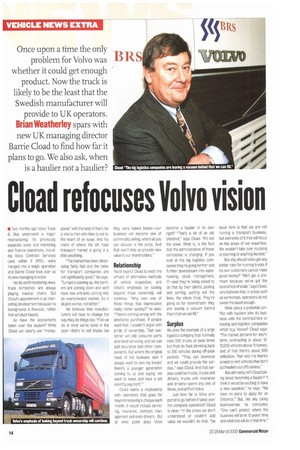Cload refocuses Volvo vision
Page 16

If you've noticed an error in this article please click here to report it so we can fix it.
Once upon a time the only problem for Volvo was whether it could get enough product. Now the truck is likely to be the least that the Swedish manufacturer will provide to UK operators. Brian Weatherley spars with new UK managing director Barrie Cload to find how far it plans to go. We also ask, when is a haulier not a haulier?
• Two months ago Volvo Truck 8,, Bus underwent a major restructuring. Its previously separate sales and marketing and finance operations, including Volvo Contract Services (and within it BPS), were merged into a single operation and Barrie Cload took over as its new managing director Hardly earth-shattering news; truck companies are always playing musical chairs. But Cload's appointment is an interesting development because his background is financial, rather t'an product-based.
So have the accountants taken over the asylum? While Cload can clearly use "money
speak" with the best of them, he is also a man who likes to cut to the heart of an issue. And his vision of where the UK road transport market is going is a little unsettling.
The market has been developing fairly fast and the rates for transport companies are not significantly good," he says. "Europe's opening up, the barriers are coming down and we'll have new entrants coming into an overcrowded market. So it all gets worse, not better."
He believes that manufacturers will have to change the way they do things too: "If all we do is what we've done in the past—that's to sell trucks like they were baked beans—our business will become one of commodity selling, where all you can discuss is the price. And that won't help us provide new value to our shareholders.'
Relationship
You'd expect Cload to extol the virtues of alternative methods of vehicle acquisition, and Volvo's emphasis on looking beyond truck ownership will continue. "Why own one of those things that depreciates really rather quickly?" he asks, "There's nothing wrong with the emotional purchase, if people want that. I wouldn't argue with pride of ownership. That customer will still consume parts and need servicing, and we can add insurance and other components. But where the original head of the business said 'I always want to own my trucks' there's a younger generation coming to us and saying 'we want to lease and have a set monthly payment'."
Cload wants a relationship with operators that goes far beyond receiving a cheque each month. It would include servicing, insurance, contract management and even drivers. But at what point does Volvo become a haulier in its own right? "That's a bit of an old chestnut," says Cload. "It's not the issue. What is, is the fact that the administration of those companies is changing. If you look at the big logistics companies they're going further and further downstream into warehousing, stock management. IT—and they're being asked to do that by their clients, picking and sorting, putting out the lines, the whole thing. They're going so far downstream they are leaving a vacuum behind them that we can fill."
Surplus
He cites the example of a large logistics company that normally runs 500 trucks at peak times but finds its fleet shrinking back to 350 vehicles during off-peak periods. "They can downsize and we could provide the surplus," says Cload. And that surplus could be trucks, trucks and drivers, trucks with insurance and drivers—perm any one of those, and all from Volvo.
Just how far is Volvo prepared to go before it takes over the complete operation? Cload is clear: "In the areas we don't understand or couldn't add value we wouldn't do that. The issue here is that we are not running a transport business, but elements of it that will focus on the areas of our expertise. We wouldn't take over routeing or planning or anything like that."
But why should Volvo get any better rate for running trucks if its own customers cannot make good money? "Well get a premium because we've got the economics of scale," says Cload, who believes that, in areas such as workshops, operators do not sweat the asset enough.
What about a potential conflict with hauliers who do business with the contract-hire or leasing and logistics companies which buy Volvos? Cload says: "The market demand for shortterm contracting is about 1012.000 vehicles above 15 tonnes, and of that there's about 85% utilisation. That tells me there's a need to rent vehicles that don't put hauliers out of business."
But ultimately isn't Cload talking about becoming a haulier? "I think it would be exciting to have a new Question," he says. "We have no plans to apply for an 0-licence." But, like any canny businessman, he concludes: "One can't predict where the business will be in 10 years' time and what one will do in that time."




























































































































